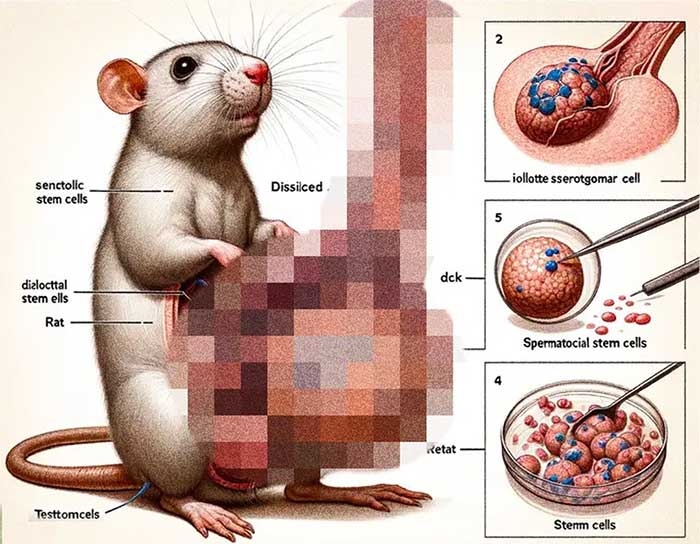A report by three Chinese scientists was retracted from a prestigious scientific journal due to the use of images generated by artificial intelligence software.
The article, titled “The Cellular Function of Spermatogenic Stem Cells Related to the JAK/STAT Signaling Pathway”, was published in the renowned journal Frontiers on February 13.
The JAK/STAT pathway is an important signaling route in cells, involved in processes such as immunity, cell division, cell necrosis, and tumor formation.
The article stirred a significant uproar in the scientific community and on social media, not because of its content, but due to the illustrative images used in the paper.
The authors of the study—three Chinese scientists including Guo Huanwu, Liang Dong, and Hao Dingjun—allegedly utilized Midjourney, an artificial intelligence software that generates images from text descriptions, to create illustrations for their scientific research.

Illustrative image in the retracted scientific report suspected to be generated by artificial intelligence (Photo: Frontiers).
For instance, this scientific report featured a bizarre illustration of a mouse’s penis, with the size exaggerated far beyond that of the mouse’s body. The image also contained basic spelling errors and even “slang” terms referring to the penis, which many identified as mistakes made by the AI software.
As images from the report spread across social media, scientists pointed out the discrepancies in the illustrations and questioned the peer review process of the paper.
Prior to this, the Chinese authors had submitted their research report to the prestigious journal Frontiers. The report was reviewed by two Indian scientists and one American scientist before publication.
Jingbo Dai, an American scientist working at Northwestern University and one of the reviewers, noted that he had observed irregularities in the illustrative images of the report, but his responsibility was to “review the scientific aspects”, so he overlooked the content regarding the illustrations and focused solely on the report’s substance.
Beyond the illustrations, many suspected that information within the scientific report may also have been generated by AI tools, raising doubts about the accuracy of the research.
Two days after the report by the three Chinese scientists was published in the journal and received extensive feedback regarding the discrepancies in the illustrations, Frontiers withdrew the paper from its website and launched an investigation.
During its investigation, Frontiers discovered that one of the scientists who reviewed the report had raised concerns about the illustrative images and requested the authors to make revisions, but this had been ignored.
Recently, Frontiers decided to retract the report by the three Chinese scientists and issued an apology to the academic community.
“We acted swiftly based on feedback from the scientific community regarding the AI-generated figures in the paper. We sincerely apologize to the scientific community for this oversight and thank readers for promptly bringing this issue to our attention,” a representative of Frontiers stated.
|
Frontiers is a highly regarded open-access academic publisher in the fields of science, technology, and medicine. The journals of Frontiers are reviewed and assessed by over 100,000 leading researchers across more than 600 disciplines. Currently, Frontiers is one of the largest and most highly cited publishers globally. Research articles published by Frontiers are freely accessible and have received over 500 million views and downloads, along with more than 1 million citations. |





















































